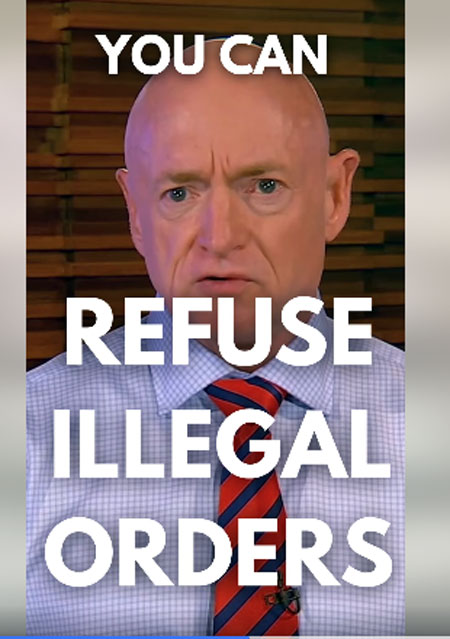WASHINGTON – President Donald Trump called Thursday for Arizona Sen. Mark Kelly and five other Democrats “traitors” who should face trial for sedition – a crime punishable by death.
The lawmakers, all veterans of the military or intelligence services, posted a video reminding active-duty personnel that they can refuse to obey illegal orders.
Democrats condemned the president’s call for prosecution as outrageous. Legal experts rejected the idea that anything in the video amounted to sedition.
“I’ve had a missile blow up next to my airplane, been shot at dozens of times by anti-aircraft fire, and launched into orbit — all for my country. I never thought I’d see a President call for my execution,” Kelly, a Navy combat pilot and astronaut, posted on social media. “Trump doesn’t understand the Constitution, and we’re all less safe for it.”
At the White House, press secretary Karoline Leavitt asserted – inaccurately – that the Democrats had urged military personnel to disobey lawful orders.

She said Trump does not want them executed, but “they should be held accountable.”
In the compilation-style video posted Tuesday, Kelly says, “Our laws are clear. You can refuse illegal orders. … Your vigilance is critical.”
Others repeat the point in the 90-second video: Sen. Elissa Slotkin of Michigan and Reps. Chris Deluzio and Chrissy Houlahan of Pennsylvania, Maggie Goodlander of New Hampshire, and Jason Crow of Colorado.
“Right now, the threats to our Constitution aren’t just coming from abroad, but from right here at home,” they say, adding, “No one has to carry out orders that violate the law or our Constitution.”
The video doesn’t mention any specific order that the lawmakers consider illegal.
Leavitt insisted that Trump has never issued an illegal order, despite the insinuation that he has.
Many Democrats say Trump has acted outside the law by ordering deadly strikes off the coast of Venezuela on boats his administration says were carrying drug smugglers. On Thursday afternoon, a federal judge ruled that his deployment of the National Guard in the capital was unlawful.
Trump’s response to the video came two days after it was posted. In a series of Truth Social posts, he described their behavior as “seditious” and said they “should be ARRESTED AND PUT ON TRIAL.”
He reposted a suggestion to hang the Democrats because “GEORGE WASHINGTON WOULD!!”
“This is really bad, and Dangerous to our Country. Their words cannot be allowed to stand. SEDITIOUS BEHAVIOR FROM TRAITORS!!! LOCK THEM UP???” Trump wrote.
The Judge Advocate General Handbook says that orders from the chain of command are presumed lawful but that “soldiers have a duty to disobey” an order that “a reasonable person would recognize” as unlawful.
Federal statutes regarding sedition make it a crime to incite violence against the government or to try to overthrow the government.
Reporting from Politifact and other outlets found that legal experts see no basis for prosecution, especially since the lawmakers explicitly urged military and intelligence personnel to obey the law, not break it.
“Every American must unite and condemn the President’s calls for our murder and political violence,” the lawmakers said in a joint statement responding to Trump’s “sedition” posts. “In these moments, fear is contagious, but so is courage. We will continue to lead and not be intimidated.”
They emphasized that each of them had sworn an oath to protect and defend the Constitution. Trump has also done so twice at his inaugurations.
“What’s most telling is that the President considers it punishable by death for us to restate the law,” Kelly and the others said in their statement. “Our servicemembers should know that we have their backs as they fulfill their oath to the Constitution and obligation to follow only lawful orders. It is not only the right thing to do, but also our duty.”
Speaking last week at Utah Valley University – the site of Charlie Kirk’s murder, Kelly blamed Trump for stoking political violence.
At the daily press briefing, Leavitt defended her boss and asserted that the “radical message from sitting members of Congress” amounted to a conspiracy.
“You have sitting members of the United States Congress who conspired together to orchestrate a video message to members of the United States military … encouraging them to defy the president’s lawful orders,” she said, one of several times she misstated their remarks.
“They are literally saying to 1.3 million active duty service members to defy the chain of command, not to follow lawful orders.”
The false implication that Trump has issued illegal orders, she said, “could inspire chaos and it could incite violence, and it certainly could disrupt the chain of command.”
Leavitt denied that Trump wants to see the lawmakers executed, despite what he posted.
At the Senate, Minority Leader Chuck Schumer, D-N.Y., denounced Trump’s comments, saying he “is lighting a match in a country soaked with political gasoline.”
“Every senator, every representative, every American, regardless of party, should condemn this immediately and without qualification,” he said. “Because if we don’t draw a line here, there is no line left to draw.”
House Speaker Mike Johnson, R-La., sided with Trump, calling the Democrats’ words “wildly inappropriate.” He defended the posts about “seditious behavior,” saying that Trump was simply “defining the crime of sedition.”
“For a senator like Mark Kelly or any member of the House or Senate to behave in that (way) is to me so just beyond the pale,” Johnson said.
On Monday, Sen. Kelly published this response.
“When I was 22 years old, I commissioned as an Ensign in the United States Navy and swore an oath to the Constitution. I upheld that oath through flight school, multiple deployments on the USS Midway, 39 combat missions in Operation Desert Storm, test pilot school, four space shuttle flights at NASA, and every day since I retired – which I did after my wife Gabby was shot in the head while serving her constituents.
“In combat, I had a missile blow up next to my jet and flew through anti-aircraft fire to drop bombs on enemy targets. At NASA, I launched on a rocket, commanded the space shuttle, and was part of the recovery mission that brought home the bodies of my astronaut classmates who died on Columbia. I did all of this in service to this country that I love and has given me so much.
“Secretary Hegseth’s tweet is the first I heard of this. I also saw the President’s posts saying I should be arrested, hanged, and put to death.
“If this is meant to intimidate me and other members of Congress from doing our jobs and holding this administration accountable, it won’t work. I’ve given too much to this country to be silenced by bullies who care more about their own power than protecting the Constitution.”
Editor’s Note: The concept of lawful orders gained prominence after World War II through the Nuremberg Trials (1945–1946), where Nazi leaders and officials were prosecuted for war crimes, crimes against humanity, and genocide. Many defendants invoked the “superior orders” defense—claiming they were “just following orders” from higher authorities, such as Adolf Hitler—but the tribunal rejected this, ruling that individuals remain personally responsible for their actions if they knew (or should have known) the orders were unlawful. The trials established that obedience to illegal commands does not absolve culpability, especially for atrocities, and this became a cornerstone of international law. Under customary international humanitarian law, subordinates are not relieved of criminal responsibility if they were aware that the act they were ordered to commit was illegal. This precedent shifted military ethics worldwide, emphasizing that soldiers must refuse unlawful orders.
During the Vietnam War, this Nuremberg principle was applied in U.S. military trials, most notably in the case of the My Lai Massacre on March 16, 1968, where American soldiers killed hundreds of unarmed Vietnamese civilians in the village of My Lai. Lieutenant William Calley, who led the platoon, was court-martialed and convicted of premeditated murder in 1971 for ordering and participating in the killings. Calley argued he was following superior orders from Captain Ernest Medina to “waste” the village, but the court determined these were unlawful and that Calley should have recognized and disobeyed them, as they violated rules of engagement and international law. His defense referenced the Nuremberg rulings, but it was rejected, reinforcing that “just following orders” is not a valid excuse for war crimes. Calley’s conviction (later reduced to house arrest amid public controversy) highlighted how the WWII-era rejection of the superior orders defense influenced accountability in later conflicts like Vietnam, where several other soldiers were also tried or investigated for similar reasons.










